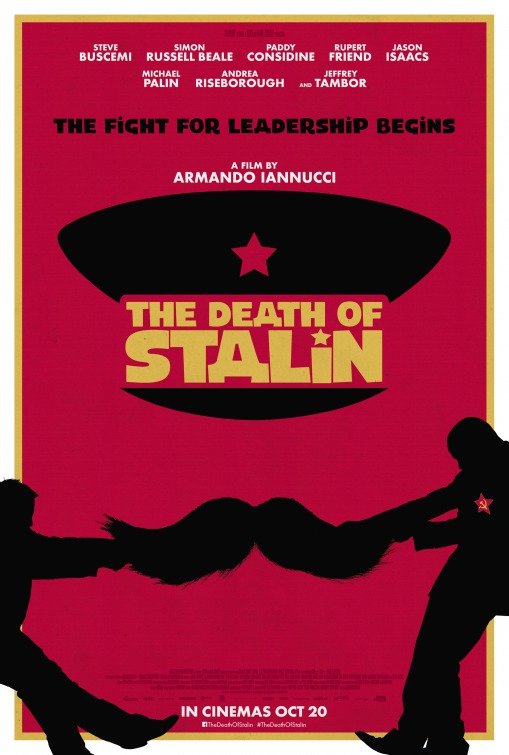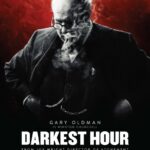The Fight For Leadership Begins
Director
Armando Iannucci
Starring
Steve Buscemi
Simon Russell Beale
Jeffrey Tambor
Jason Isaacs
1953, the Soviet Union is ruthlessly ruled by Joseph Stalin and his cronies. Anyone who falls out of favour or challenges the establishment is arrested, tortured and executed. For those at the top, there is an impression of luxury and frivolity but the truth of the matter is that the alliances are loose; no one is trusted and everyone operates under the constant fear of falling out of Stalin’s favour and appearing on a list that will seal their fate. Following a stroke, Stalin is left in a paralytic state while his closest officials run around to secure their own position. While the events closely mirror what we know about the genuine history of the event, this adaptation of the French graphic novel, La Mort De Staline, hilariously and crassly illustrates the scheming, conniving and treachery that was rife during the chaos.
In terms of absurdist caricatures negotiating deadly serious developments, a lot of Iannucci’s work feels reminiscent of Dr Strangelove; for that reason, I am a very big fan. I will openly admit this style of comedy is definitely not for everyone but with its mix of a historical setting, political underhandedness and foul-mouthed deliveries, it’s my absolute favourite type of comedic narrative. One of the film’s real achievements is establishing the tone of the comedy of fear. What is presented to us was a very real and horrifying existence that many had to endure, wherein family members turned on one another, few were trusted and seemingly no one was safe. To then take that level of paranoia and intense distrust and repurpose it into farce is simply wonderful. Nowhere is this better established than the opening sequence. To highlight Stalin’s vice-like grip on the nation, we witness a concerto played over the radio. The theatre director receives a phone call mid-performance from Stalin himself and told he wants a recording of the performance. Realising that the concert went out live and that no such recording exists, the director panics, detaining as many of the audience as possible before getting people off the streets and making everyone sit through the same piece again. While witnessing the absurdity of rearranging the concerto we are shown citizens being routinely and mercilessly rounded up for detention or execution.
What’s more, there is an (one would assume intentional) undercurrent reflection of modern politics. With everything that’s taken place in the shambolic government currently running this country (the UK) and similarly with others across the world, this tale of underhand dealings, betrayal and political mobilisation serves to satirise and ridicule what we are all currently at the mercy of, as both a highlight of the cyclical nature of vacuums of leadership and a warning from the past.
Aside from the keen writing and performances – which stand out as the backbone of this feature – The Death Of Stalin is also exceptionally well crafted. Unlike a lot of comedies, which thrive on brightly lit sets to ensure maximum control in case of improvised hilarity, this film is presented like a standard high-budget period drama. The locations are lavish and resplendent, the costumes are fitting for the period and reflect the character in question, all of the props feel period appropriate while being garnished with faux-Cyrillic Russian lettering and the cinematography that presents it all is rich, dynamic and beautiful. On top of that, the direction is masterfully handled and the editing is sharp and clean throughout.
But as stated, this film thrives because of the combination of the brilliant dialogue and uproarious performances. With a host of largely British acting talent, each character is simultaneously amusing and ridiculous. Buscemi is magnificent as the neurotic but politically savvy Khrushchev, Tambor plays the feeble and easily led Malenkov effortlessly, Michael Palin’s turn as the quixotic almost lackadaisical Molotov is greatly entertaining and all the lower-rung manipulators enter and exit with the weight of their station without over-emphasising their arrival or departure. As a few standouts, I particularly enjoyed Beale’s genuinely menacing portrayal of head of the NKVD Lavrentiy Beria; the level of historical detail on display is impressive without stifling the audience and his presence and manoeuvring are a joy to watch. In a very different performance, Jason Isaacs’ arrival is perfectly timed. Having spent so long with meticulous, cross-talking politicians, General Zhukov’s introduction and domination of events – with his no nonsense attitude and minimal tolerance for the machinations of politics – is a welcome change-up and serves as a nice reminder of the savagery and ruthlessness of senior military personnel who survived both the events of World War II and Stalin’s purges.
But as much as I adore this film, there is a glaring issue. Drawing from real events ensures a lack of closure and a void where a neat ending should exist, subsequently, much like In The Loop the film simply peters out rather than distinctly ending. Granted there are events which solidify a resolution but not enough to really deliver a satisfying conclusion for most audiences. As stated before, this ties into the other issue which is that this film is not for everyone. The comedy is particularly unique and in-line with a distinct style that doesn’t suit the bulk majority of cinemagoers but the fact this film doesn’t try to accommodate the mainstream pleases me. Rather than trying to spread itself thin in an attempt to be a tick-box exercise, The Death Of Stalin sets out to tell a story in its own fashion and doesn’t overly care for people getting lost in the process; for that, I highly commend it.
Release Date:
20th October 2017
The Scene To Look Out For:
Several real-life parallels are utilised as comic developments which serve to highlight the ludicrousness of how Stalin ran the Soviet Union. Thus something which should be common sense is only revelatory at the worst possible moment. Case in point, Stalin didn’t trust doctors so had the most talented or knowledgeable ones tortured, exiled or killed. Subsequently, when he needed medical assistance, there were very few options to draw on. This, amusingly, comes as a bit of a shock to the Politburo who fumble wildly trying to assemble doctors who are either beyond their prime, inexperienced or inept.
Notable Characters:
Rather than highlight one performance, I think it would be better to note that this cast works as an impressive ensemble. With pleasing chemistry and noteworthy individual portrayals, each actor shines in their own right but works superbly with their co-stars. This is evident fairly early on in a specific wonderful diatribe on the mad and incompetent scramble for power. Once Stalin’s unconscious body is discovered, each member of the Politburo arrives and proffers their sympathies at the calamity that has happened but it’s evident their lament is almost entirely for show. Each one arrives wailing and beating their chests while looking around “the boss'” office for anything that can assist their ascension. The best way this is illustrated is a very simple running gag involving the puddle of urine that Stalin is lying in. Every character runs to cradle the fallen leader but the second their knees reach the piss soaking into the rug, they hesitate, pull away and reassess how to approach him. It’s such a simple touch but it shows how in tune each actor is with those they are sharing screen time with.
Highlighted Quote:
“You’re not old! You’re not even a person; you’re a testicle! You’re mostly hair!!”
In A Few Words:
“A brilliantly witty and savage takedown of both a rather manic event in history and the contemporary political theatre”
Total Score: 5/5
![The Red Right Hand Movie Reviews [Matthew Stogdon]](https://reviews.theredrighthand.co.uk/wp-content/uploads/2021/12/cropped-header1.png)




